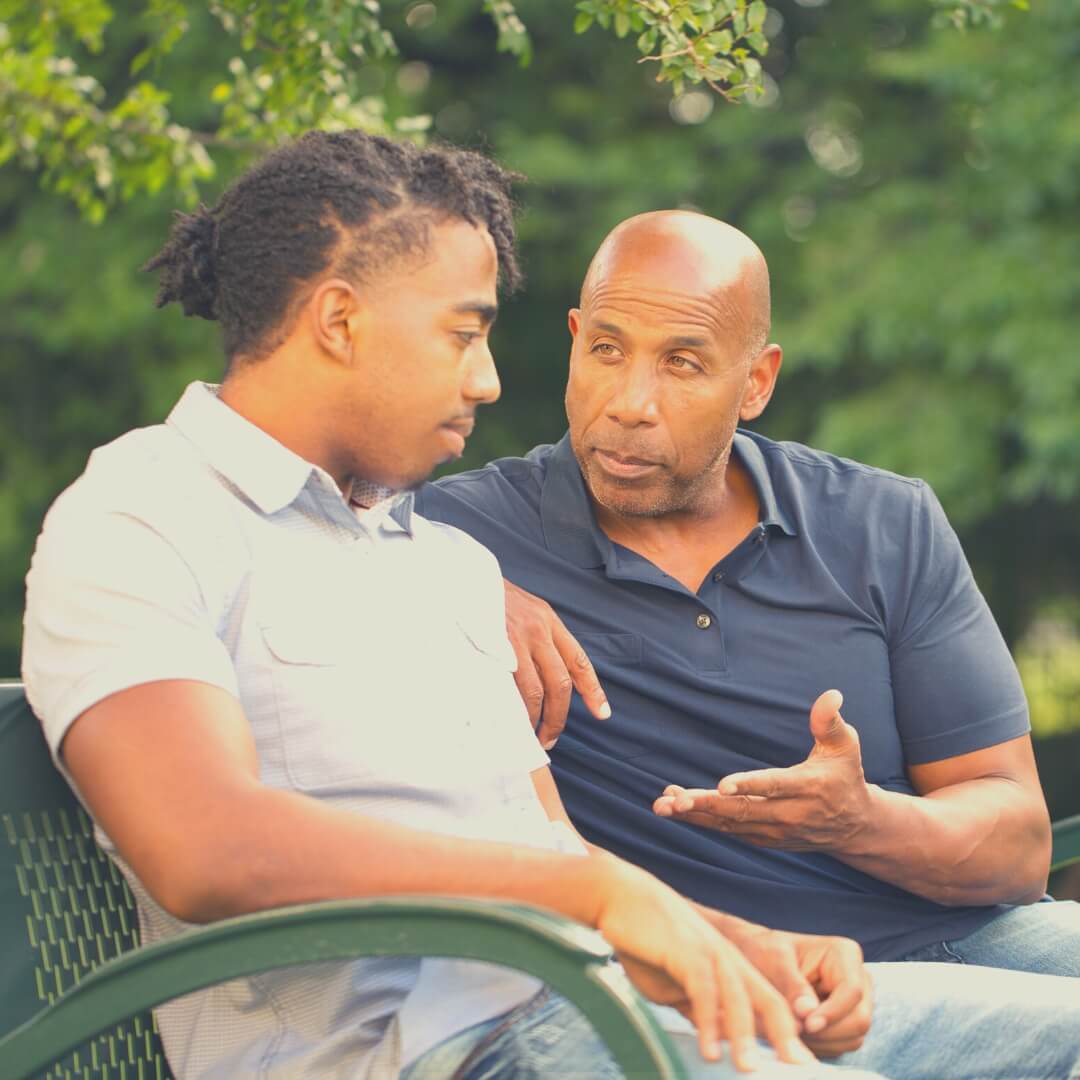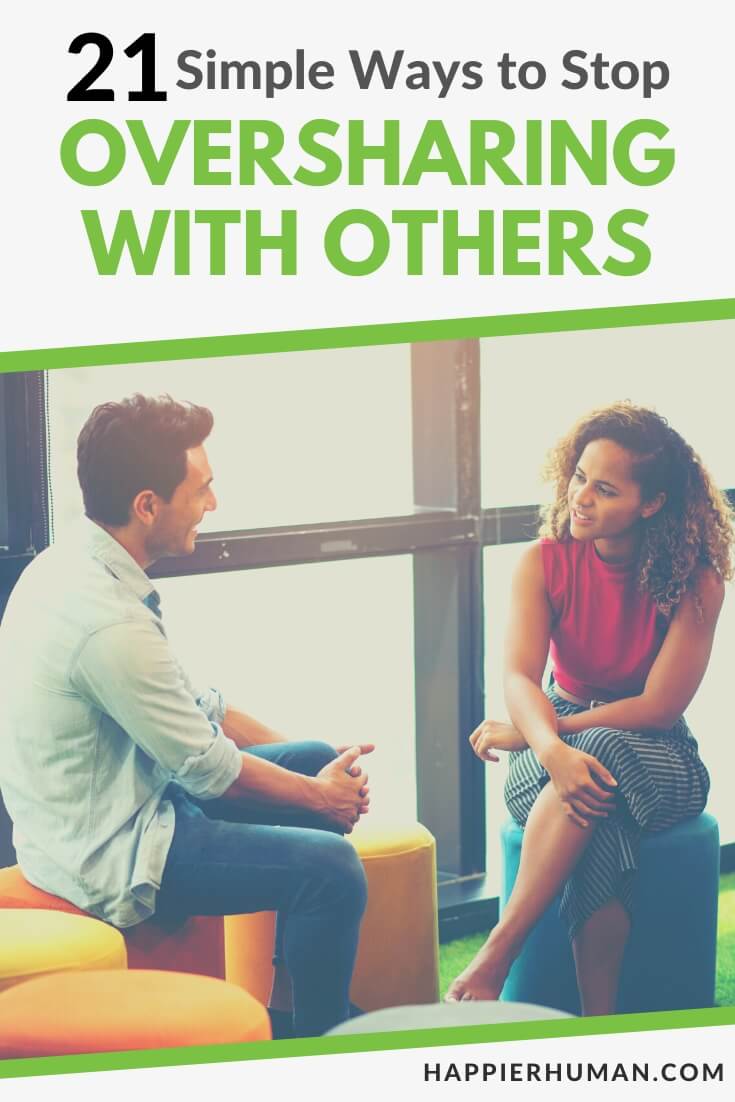My 36-year-old daughter never learned how to stop oversharing. One day, she ventured out into the freezing cold in her Chewbacca pajamas to help her husband bring firewood inside.
She slipped on ice, fell, screamed, “Wookiee down!” and shared it to social media. The following day, she arrived at work to be inundated with dozens of “Wookiee down!” condolences.
Everyone overshares at least once in their life, but learning how to stop oversharing is important.
My daughter’s regrets and embarrassment are re-lived every winter as her coworkers torment her with the dreaded “Wookiee down!” alert. Oversharing has its repercussions.
This article will explain what oversharing is, who is prone to do it, and why they do it. I’ll guide you through the signs of oversharing, its negative aspects, ways to stop and the benefits, and what to do if you’re on the receiving end of oversharing.
What is Oversharing?
Oversharing is telling personal or intimate information to others, whether they are friends, family, or strangers. It occurs in one-on-one conversations or group settings through online platforms, electronic devices, or verbal communication.
Examples of oversharing include:
Oversharing contrasts under-sharing. One is wise, protective, and appreciated by most receivers. The other is not. What do you think?
People Prone to Oversharing
We’ve all overshared information at some time in our lives. Sometimes, we inevitably cross the grey line, mostly due to our emotions. However, some people are more vulnerable to the temptation of oversharing.
These are a few things that fuel the need to overshare:
The Top Three Personality Types Most Prone to Oversharing
ESFJs (Extroverted, Sensing, Feeling, Judging Personality Type)
ESFJs love to share very detailed life experiences and opinions. They aren’t comfortable with silence, so they tend to overshare often. They’re willing to expose too much to avoid gaps in conversations.
ENFJs (Extroverted, Intuitive, Feeling, Judging Personality Type)
ENFJs are prone to overshare in an attempt to get a conversation rolling and make others feel comfortable. They tend to put too much information out there to lure others in and make connections.
ESFPs (Extroverted, Sensing, Feeling, Prospecting Personality Type)
ESFPs overshare in their excitement for life and outgoing, feel-good personalities. They like to be in control and make things happen. Oversharing is often their tool to accomplish the task.
Recognizing Signs That You May Be Oversharing
The following are indicators that you may be oversharing information:
The Negative Side of Oversharing
The dangerous or even dire consequences of oversharing may range from embarrassment or a mere threat to ruthless evildoers on the dark web wreaking havoc in your life.
No one wants this to happen. This is why oversharing must stop, no matter how innocent it may seem.
These are repercussions or negative outcomes that may manifest through oversharing:
If you tend to overshare information, it is important to do a self-examination and mindful reset. Let’s look at 21 simple ways to stop oversharing information.
21 Simple Ways to Stop Oversharing with Others
Sometimes, the intertwined workings of emotions and crossing boundaries in communication result in oversharing information.
At times, it happens inadvertently. I’ve done it in the past, and you probably have, too. Then, for other folks, oversharing has become part of their identity for various reasons.
Whether oversharing occurs for innocent unawareness, malicious intent, or anything in the middle, it has to be addressed.
If you find yourself sharing too much information, check out these simple ways to stop doing it. You may be surprised by what you learn about yourself.
1. Stop and think before you speak or post.
Taking a moment or a few before you speak can make a world of difference. The pause will cause your brain to rethink the information that you are about to put out there.
2. Meditate on why you overshare and its effect on you and others.
Meditation is a crucial aspect of how we view ourselves and our world.

It allows us to know ourselves better.
3. Seek therapy or counseling for more support.
If you recognize that you have an urge to share more than you should, a professional counselor can help you determine the underlying cause and the best approach to correct it.
4. Make a list of “safe topics” to talk about.
During your meditation, think of topics that lead to oversharing. Then, make a mental list of topics that are generally safe, so you are prepared.
5. Does the person you’re sharing with need to hear it?
Before you speak, ask yourself if it has to be stated, if the person really needs to hear it, or if it will become ammunition fired back at you.
6. Re-read your posts, emails, and texts before you hit “send.”
Always re-read your communications and make sure they are not oversharing or have the potential to be misinterpreted.
7. Recognize your oversharing triggers, identify the emotion, and resolve it before speaking.
Whatever your emotional triggers are, they probably point to your oversharing triggers as well. Connect to your inner awareness, so you make the right choice.
8. When you feel vulnerable or tempted to overshare, re-route the conversation to a “safe topic.”
When the temptation arises, go to your safe topics and avoid giving out too much information.
9. Before sharing personal information, ask yourself if that person “needs to know” and what they may do with it.
You may need to retrain yourself to think about what others will do with the information you give them. If you ask yourself that question every time, it will soon become a good habit to have.
10. Be aware and mindful of your emotions, thoughts, and words. They matter.
Words matter. They are information. Be mindfully aware of what you share.
11. Train yourself to be an active listener, allowing others to do the talking.
When you listen to others, your need to fill up space with information dissolves.
12. Teach yourself to respect boundaries for yourself and others.
If you are boundary-challenged, take extra measures to learn to respect them. It will pay off nicely, and others will notice.
13. Slap down the urge to boast by using confidence-building exercises.
You don’t need to keep up with the Joneses. Let them have their luxuries. Build your own glory by elevating your self-confidence.
14. Make peace with silence. It’s okay to not always be talking.
There is nothing wrong with silence. In fact, keeping your thoughts to yourself reaps a much greater reward than filling the airwaves with unnecessary information.
15. Practice having healthy, balanced, back-and-forth conversations within boundaries.
Not everyone is naturally equipped with communication skills, and that’s okay. Practice makes perfect.
16. Slow down your speaking speed. Be articulate and deliberate in your choice of words.
When your brain is in high gear, and you speak fast, it is way too easy to overshare. Take care to slow down.
17. When you feel the need for attention, sympathy, or someone to agree with you, see a professional counselor.
Your counselors are not family, friends, coworkers, strangers, or the internet.

Don’t broadcast your laundry with any of them. Get professional counseling.
18. Keep your comments and responses short, to the point, relevant, and within boundaries.
Keeping your comments concise and relevant makes you less likely to overshare.
19. Avoid gossip or controversial topics that may lead to passionate emotions or opinions.
High emotions lead to strong opinions and information to support those opinions. Don’t fall prey to this.
20. In your words, posts, and conversations, protect yourself, your family, and your friends first and foremost.
If it can be used for malicious reasons, assume it will be. It will help you become more protective of the information you share.
21. Learn to love yourself and accept yourself more.
Head off the urge to be anything else to anyone else by loving yourself and accepting yourself as good enough as you are. You are worthy of wonderful experiences.
The Benefits of Not Oversharing
When you overshare, you lay your soul bare to the world. And that is never, ever a good thing. “Casting your pearls before swine,” or people who won’t treasure them, brings certain demise.
On the other hand, under-sharing overlays a personality and life with a touch of mystique and attractive aura. I like that and don’t have to explain one thing to anyone. My privacy is intact, and I’m safe from bad actors. That’s just a couple of the great benefits!
These are several more benefits of not oversharing information:
Who are you trying to compete with? Who are you trying to impress? Or are you doing it to boost your self-esteem by creating a fallacy everyone else craves?
You don’t need to do that. You are enough. Love yourself for who you are with all your imperfections in privacy and with respect for yourself.
Being on the Receiving End of Someone Who Overshares
If you find yourself being on the receiving end of someone who overshares, as we all are on social media daily, don’t despair. I’ll share some great ideas with you on how to make it stop, but first, let’s look at some repercussions it can have on you if you allow it.
These are a handful of the repercussions to consider:
I’m guessing it didn’t take long to decide that oversharing is a behavior you must stop if someone brings it on you. Let’s go over some great ideas. You may think of more creative ways to add to your arsenal.
How to Stop Someone from Oversharing
One of the most difficult things to do is cut off someone who is oversharing. You may feel that they trust you or just really need a friend.

Whatever the situation, you should find a way to stop them and re-route their energies toward professional help where they can communicate in a protected environment.
Here are a few ways to stop oversharing with respect and style:
Final Thoughts on How to Stop Oversharing
While oversharing information verbally, electronically, or online has become the norm and is encouraged by many social media platforms and influencers, it has never been so dangerous to do so.
Self-restraint is needed to protect yourself and your family from those who mine the information for mal-intent.
The consequences might be as humorous as “Wookiee down!” or as serious as someone guessing her banking password. Gotcha. That’s not it. But you see what I mean.
To me, the best part of this article is the message that you don’t have to overshare! You are enough. Your life is wonderful just being you. Life is not a competition. It’s a miracle to be enjoyed. Check out 61 Respect Yourself Quotes to Empower Your Life.
For more information to help you better prepare to act and solve your problems, be sure to check out these articles:
- How to Overcome the Freeze Response: A Simple Guide
- 7 Ways to Overcome the “People are Better Than Me” Mentality
- How to Deal with Feeling Overwhelmed with Life: 7 Steps


